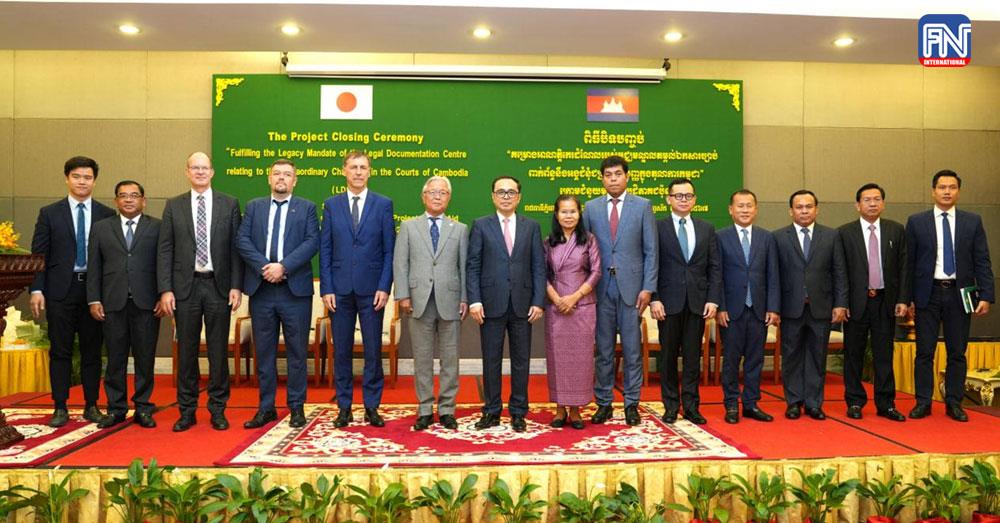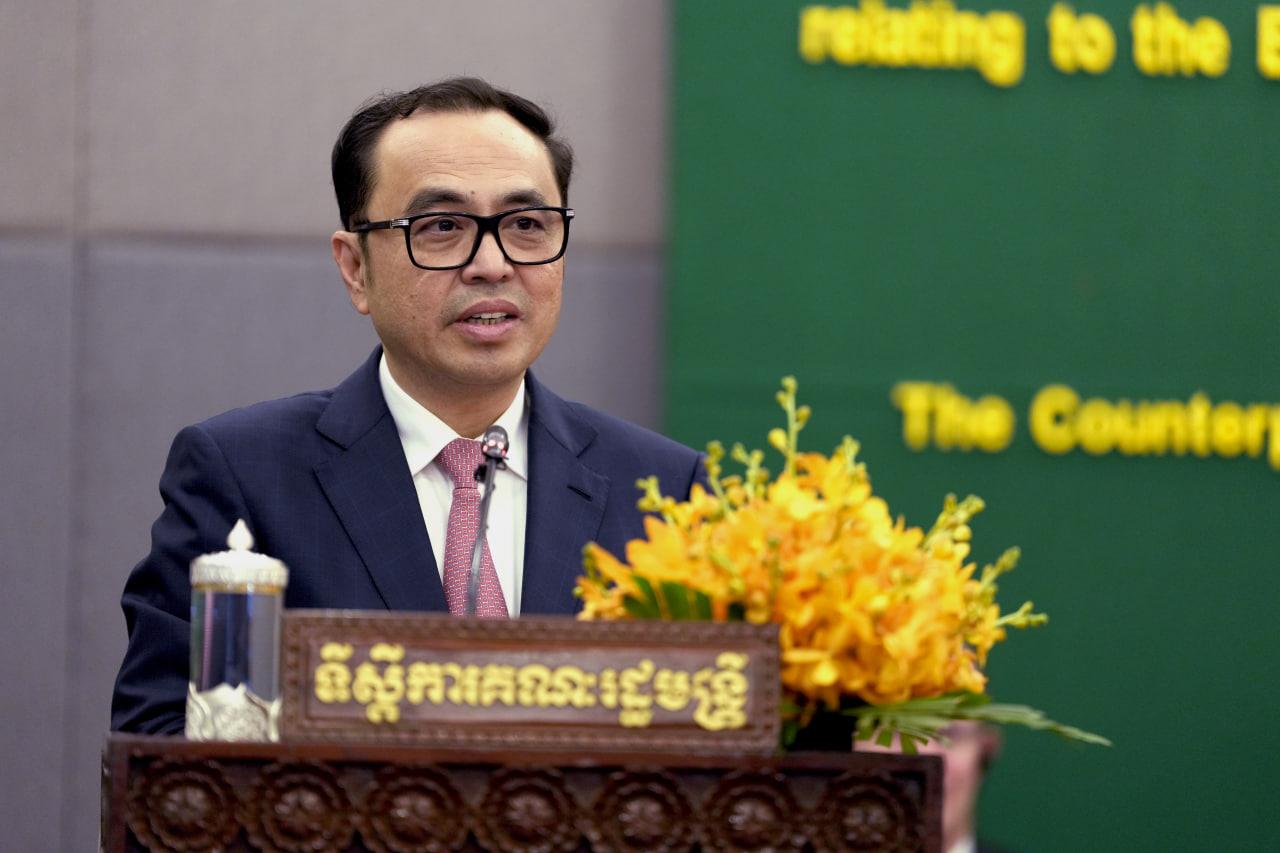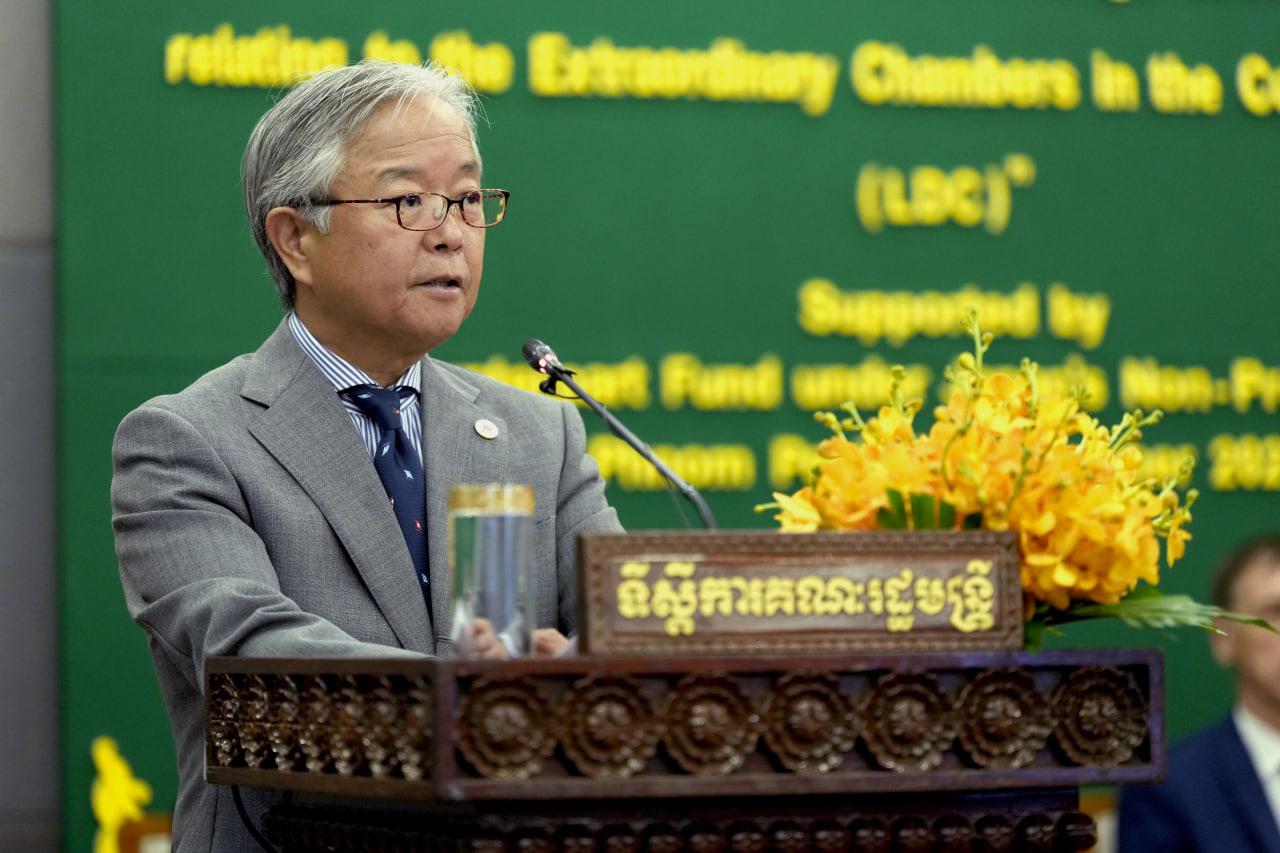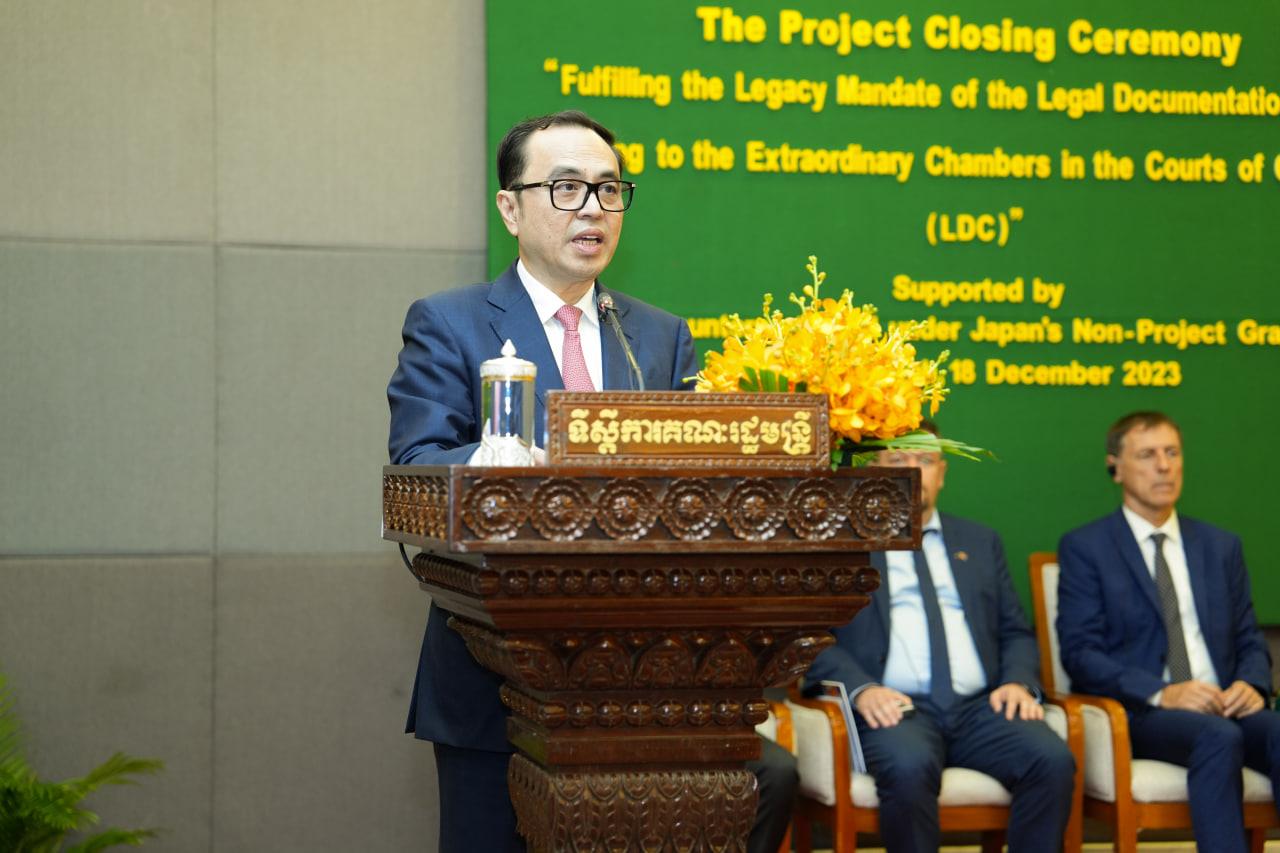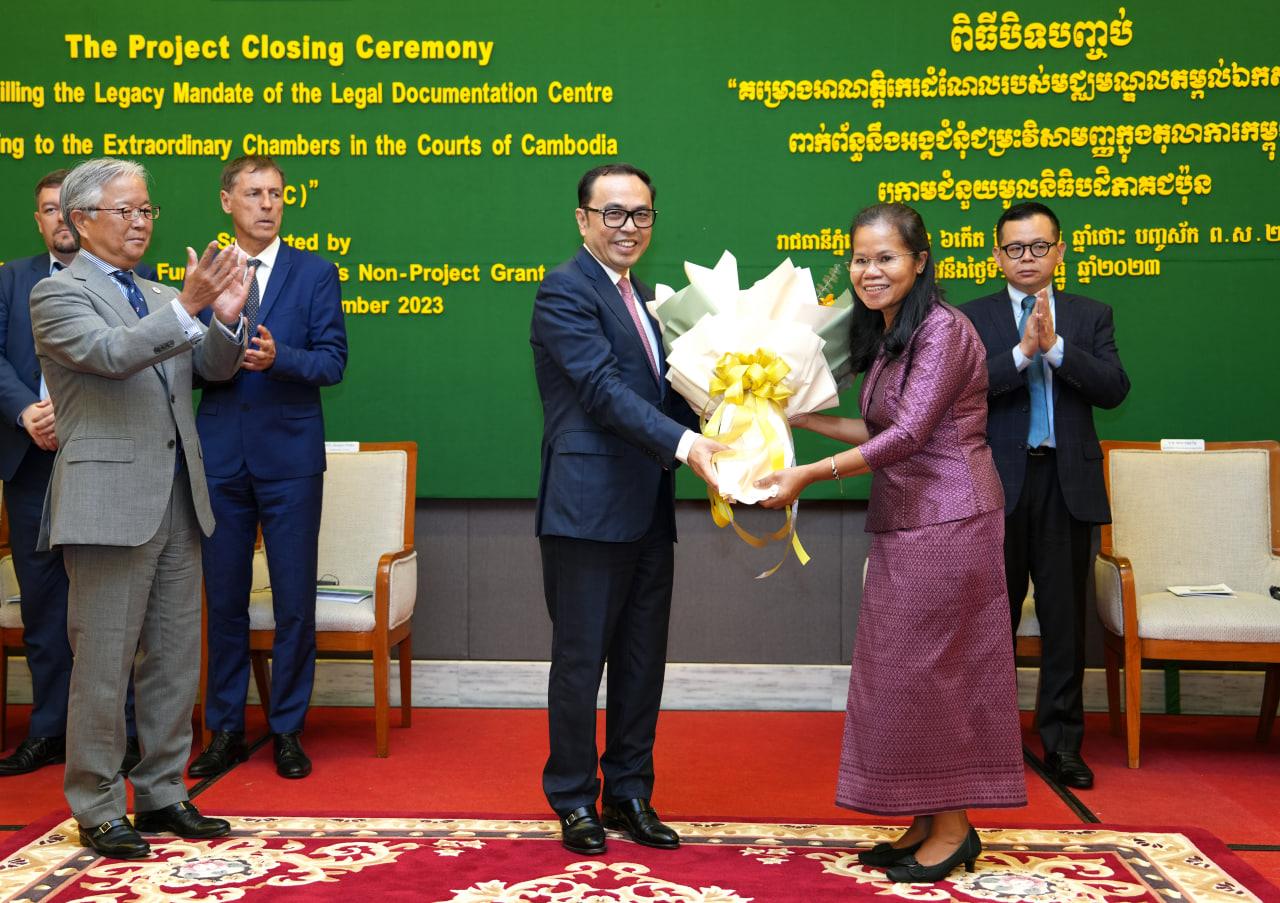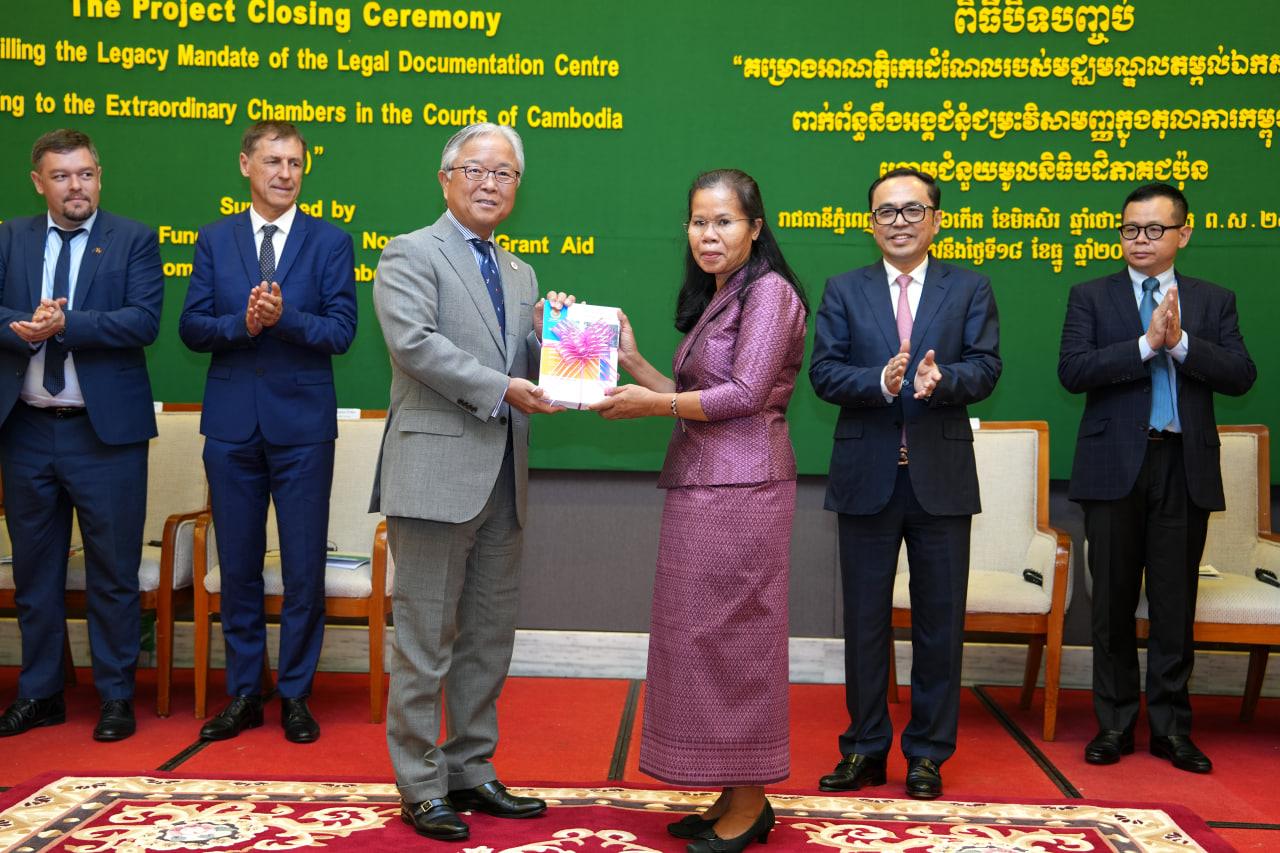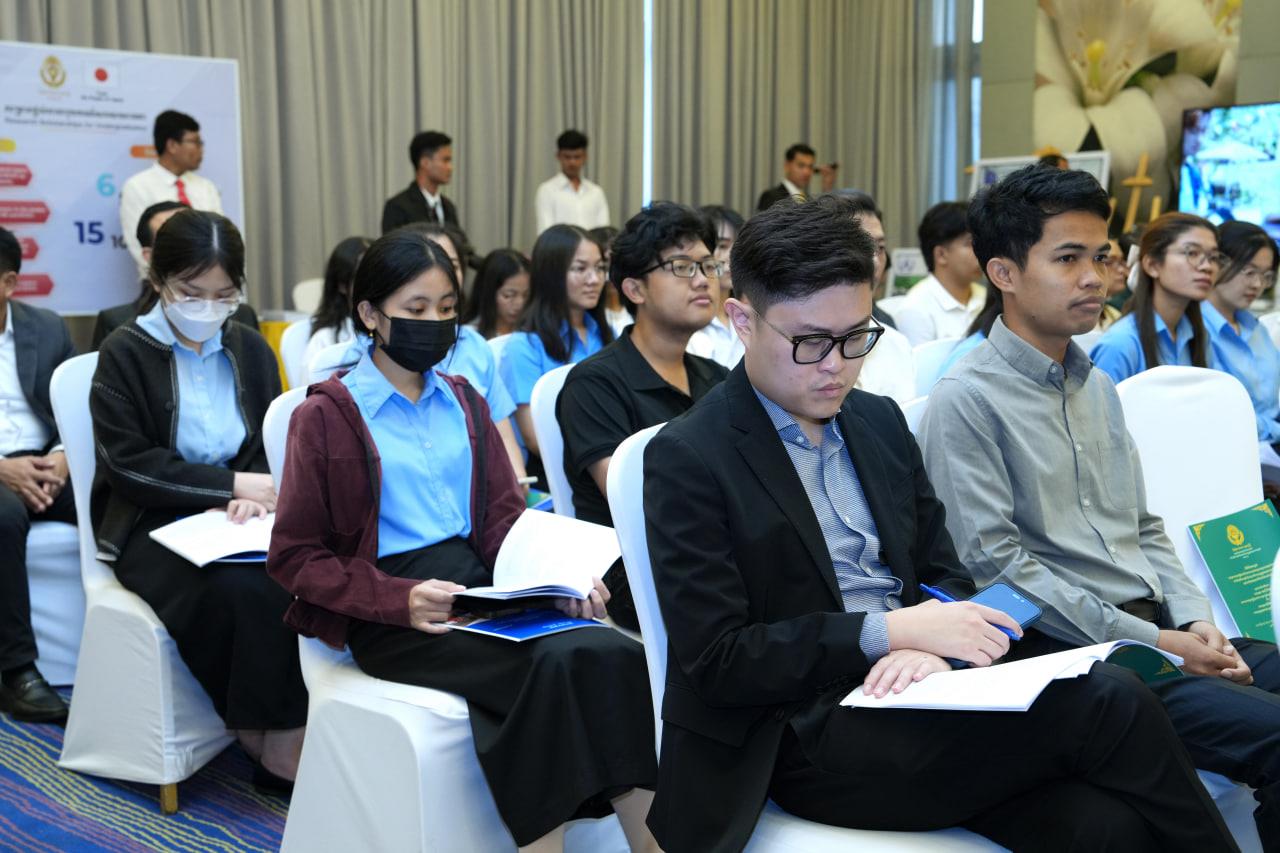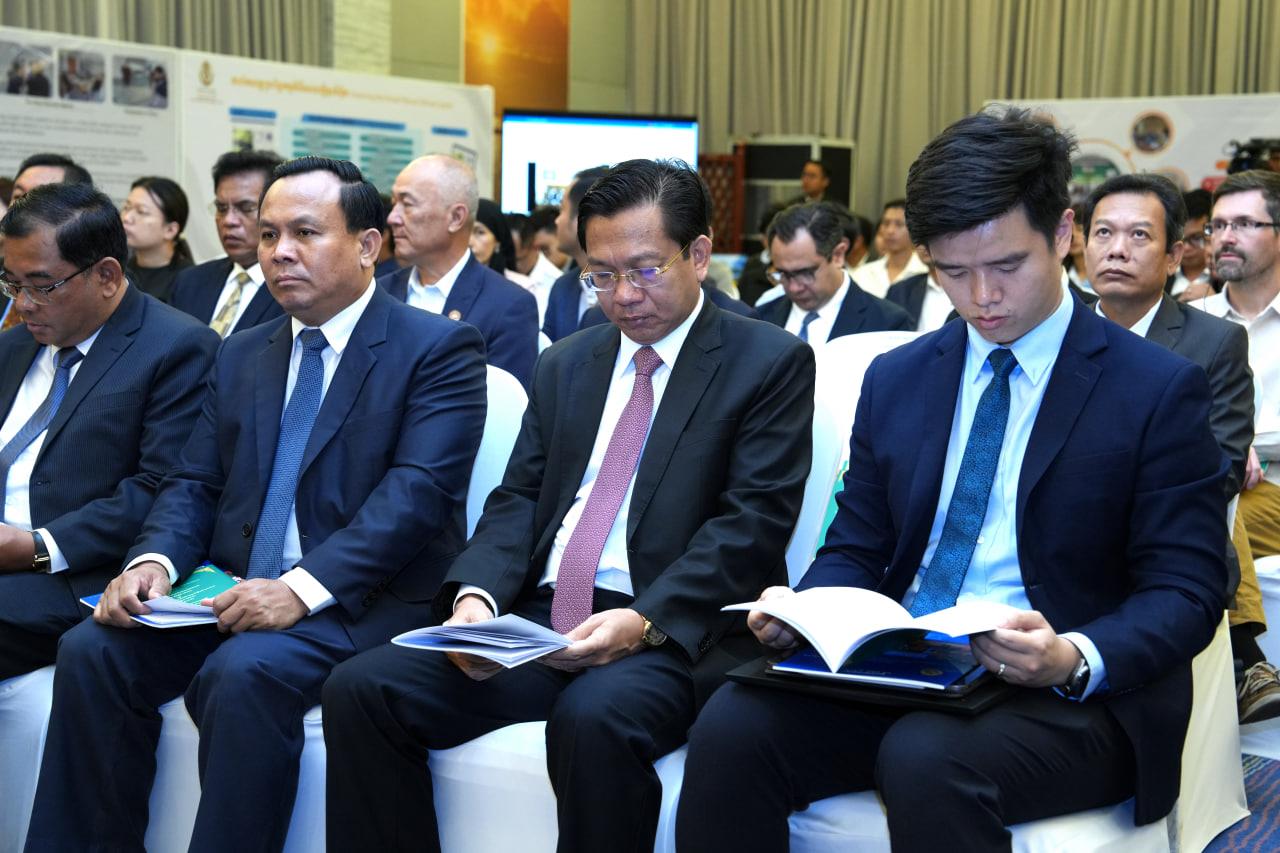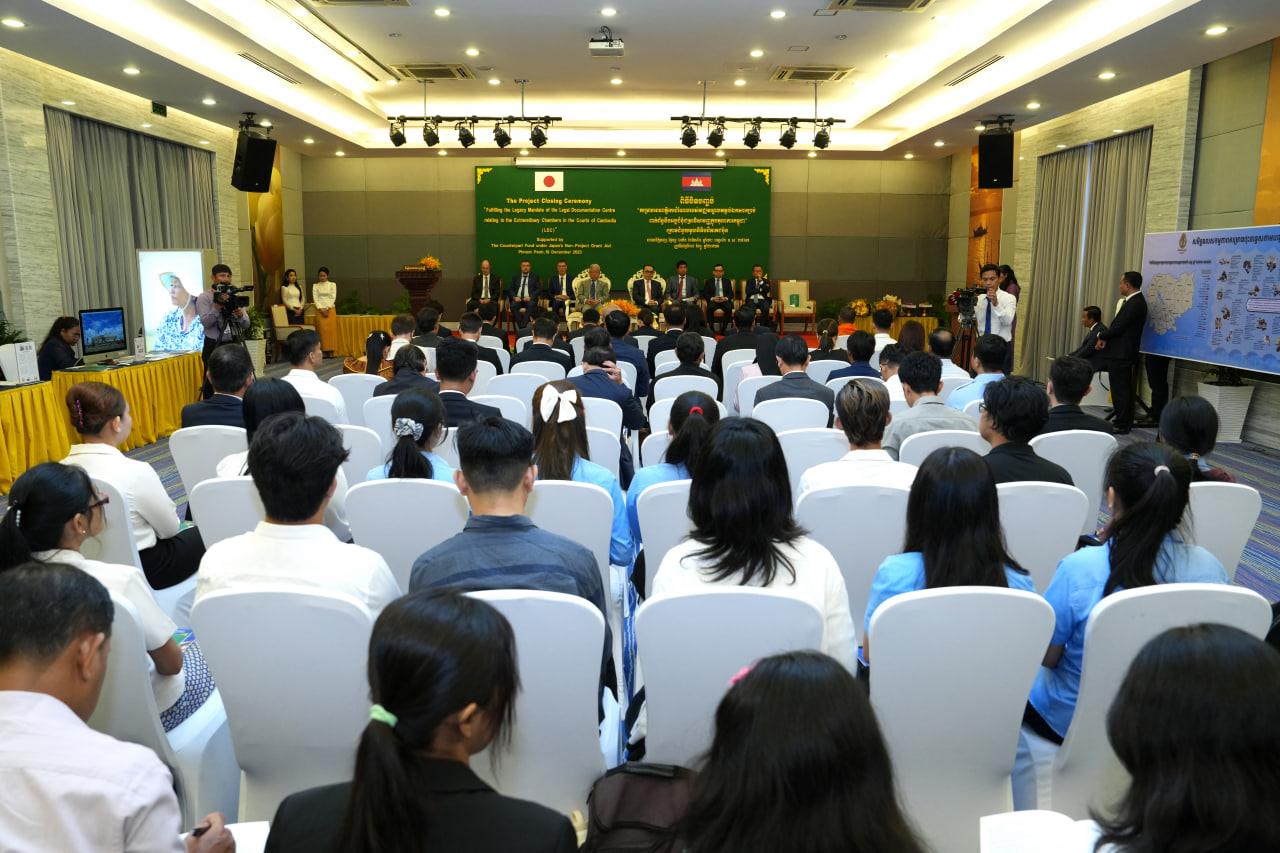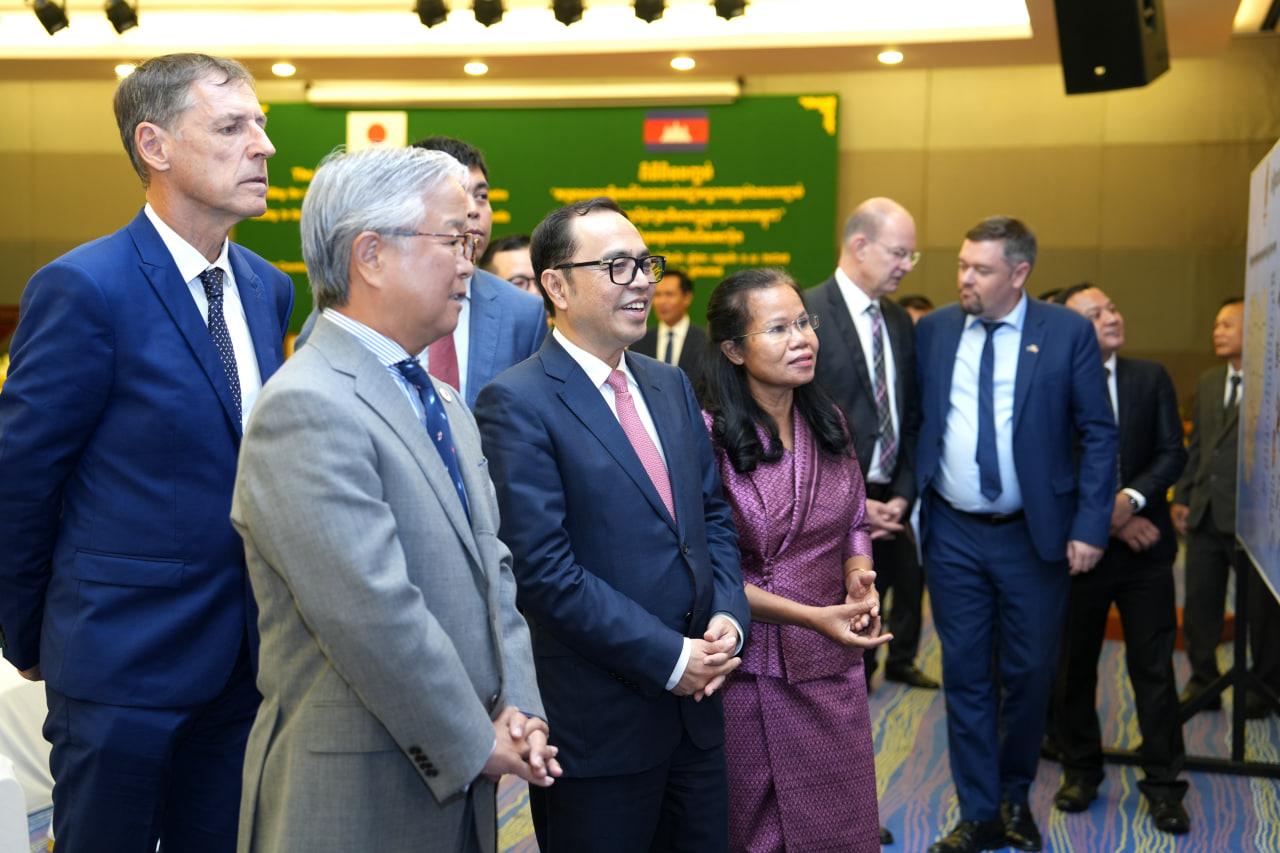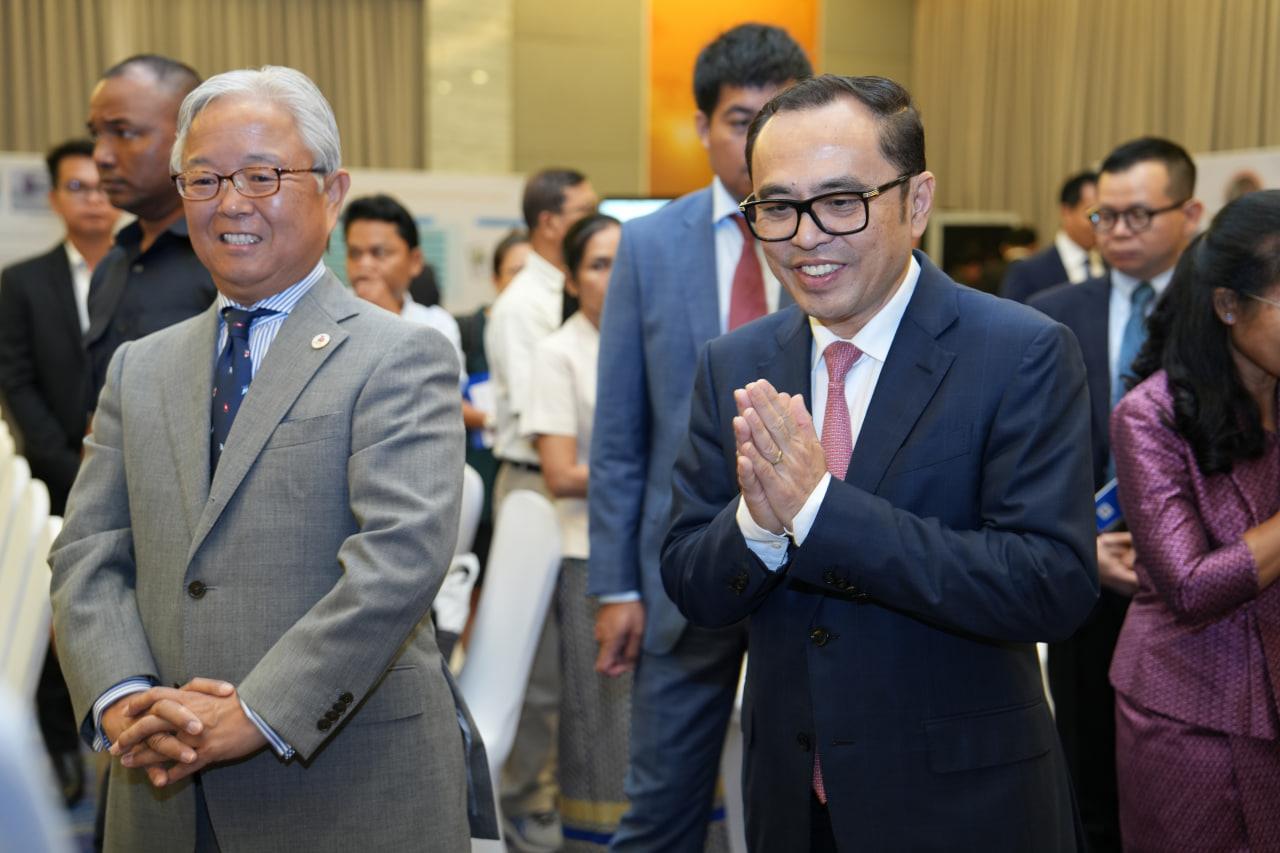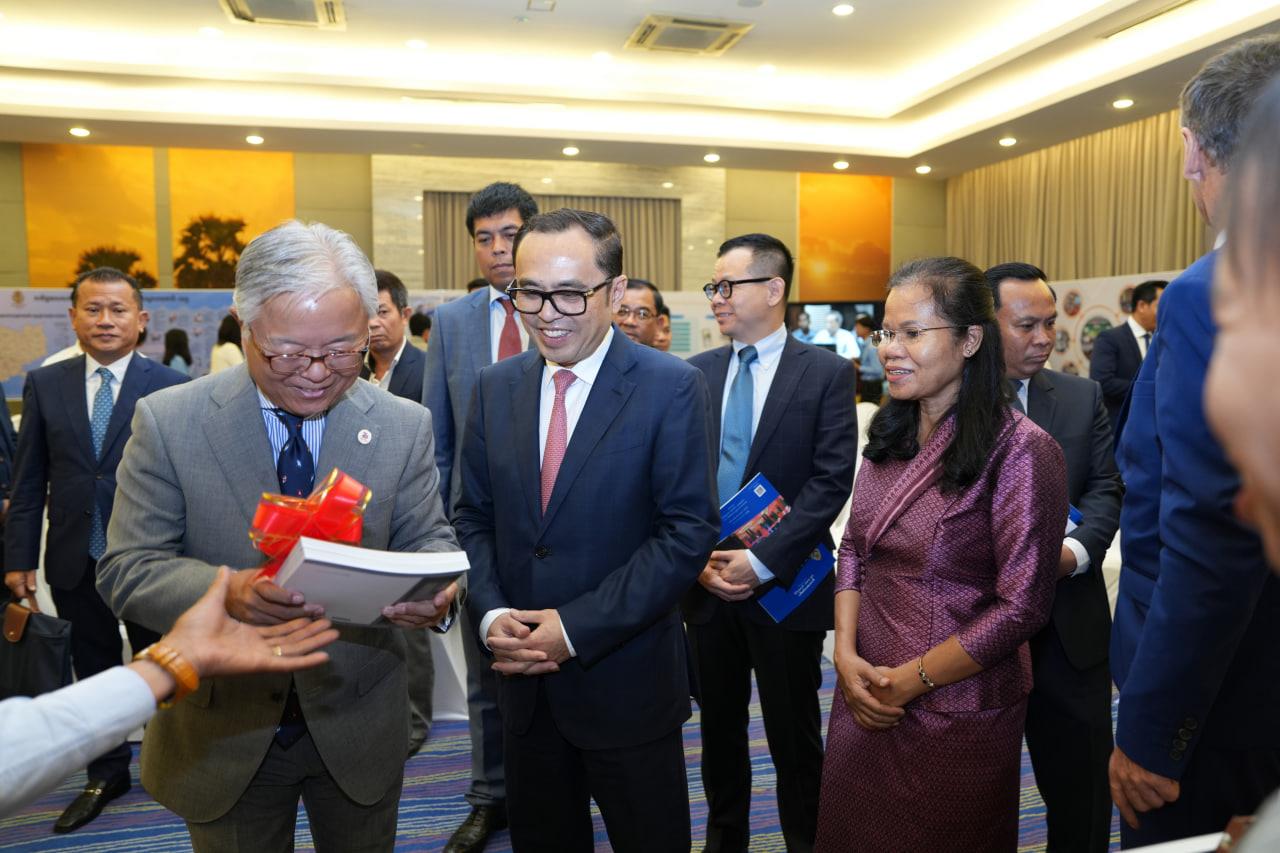Phnom Penh (FN), Dec. 19 – Vongsey Visoth, Cambodian Permanent Deputy Prime Minister in charge of the Office of the Council of Ministers, presided over the project closing ceremony of the Legal Documentation Centre Relating to the Extraordinary Chambers in the Courts of Cambodia (ECCC).
The event took place on Monday (Dec. 18) and was also attended by leaders, officials and international partners of the ECCC.
On behalf of the Royal Government of Cambodia, Vongsey Visoth expressed sincere appreciation for the unwavering support of the Government of Japan, a steadfast and loyal friend to Cambodia in all circumstances. The commitment of Japan to enhancing collaboration across various domains, including diplomacy, socio-economics, trade, investment, and technology, has been particularly noteworthy over the past three decades.
In his remarks, the deputy prime minister conveyed gratitude to the Government and people of Japan for their substantial financial and non-financial assistance in the proceedings of the ECCC. This support has extended to the construction of relevant legal archives, the development of the ECCC, and the successful implementation of associated projects crucial to these endeavours.
At the same time, Vongsey Visoth underscored that since the overthrow of the Khmer Rouge regime on 7 January 1979, the Royal Government of Cambodia, led by Samdech Techo Hun Sen, the former Prime Minister of Cambodia, has consistently prioritized and remained steadfastly committed to uncovering the truth, delivering justice to the victims, and putting an end to the culture of impunity associated with the heinous crimes that claimed the lives of over three million Cambodians.
Furthermore, the Royal Government took proactive measures by initiating the establishment and operation of the ECCC, commonly known as the "Khmer Rouge Tribunal," in early 2006. The primary objective is to facilitate and support all aspects of the tribunal, encompassing technical, financial, and material dimensions, ensuring the smooth and international culmination of the trial by the end of 2022.
The deputy prime minister highlighted that over the past 16 years, the ECCC has attained numerous successes, spanning both jurisdictional and non-jurisdictional domains. Its contributions have resulted in a commendable legacy for the Cambodian nation, fostering positive impacts within Cambodian society and resonating on the international stage.
The ECCC has yielded significant results over the past decade, including:
1. It has played a pivotal role in fortifying the rule of law and dismantling the culture of impunity within Cambodian society, even in the face of crimes perpetrated by the Khmer Rouge regime spanning nearly 50 years.
2. Cambodia has demonstrated full commitment to its obligations, actively contributing to the Universal Principles of the United Nations, specifically in safeguarding its people from grave crimes such as genocide, crimes against humanity, war crimes, and ethnic cleansing.
3. The ECCC has actively contributed to reinforcing the implementation of the Royal Government's win-win policy, championed by Samdech Techo Hun Sen. This policy has been instrumental in maintaining peace, achieving national unity, securing territorial integrity, and fostering national reconciliation across all sectors of Cambodian society. It has notably played a crucial role in safeguarding the nation's collective memory and preventing the resurgence of the brutal Khmer Rouge regime in Cambodia.
4. The ECCC has facilitated victim participation in legal proceedings as plaintiffs, allowing them to seek truth and justice for the atrocities committed by the Khmer Rouge regime. With over 650,000 victims and the general public directly engaging in the trial process or through outreach activities, the ECCC has played a vital role. Furthermore, the tribunal has directly contributed to the reform of the legal and judicial sector by enhancing the capacity of judicial and legal officers. It has also facilitated the transfer of knowledge, experience, and expertise from the ECCC to the national court system and other relevant institutions.
On this occasion, Permanent Deputy Prime Minister Vongsey Visoth emphasized that the ECCC trial process adheres to the legal system and national court, operating within the Civil Law System and with the involvement of the international community. However, it is crucial to note that Cambodia, as the host country, retains full sovereignty without ceding decision-making authority. This underscores Cambodia's leadership in administering the judicial process, fostering national unity, and promoting reconciliation.
Vongsey Visoth attributed Cambodia's accomplishments in this regard to the robust support and cooperative efforts extended by the United Nations, the international community, and other friendly nations. Notably, since 2006, the Government of Japan has played a pivotal role by providing both financial and technical assistance to the Khmer Rouge tribunal, contributing significantly to its successful completion.
Expressing appreciation for Japan's continued commitment, Vongsey Visoth highlighted additional funding from the Government of Japan for the "Legal Documentation Project of the Legal Documentation Centre Relating to the ECCC." This initiative, spanning the years 2020 to 2022, has yielded commendable results, as detailed in Chea Savon's report.
Moreover, Vongsey Visoth underscored that with the successful conclusion of the Khmer Rouge regime trial process and its international recognition, the ECCC, in accordance with the "Supplementary Agreement on Transitional Preparation and Termination of Work" between the Royal Government of Cambodia and the United Nations, has been entrusted with additional responsibilities for the initial three years from 2023 to 2025. These responsibilities include handling Legal Affairs, overseeing the maintenance of labour, managing case archives in compliance with international standards, and disseminating information to the public, including the establishment of the "ECCC Resource Centre."
To ensure continued effective collaboration with the ECCC, Mr. Vongsey Visoth urged the Legal Documentation Centre for the ECCC to carefully consider and prioritize the following key areas:
1. The importance of the Legal Documentation Centre continuing to fulfil its core roles and responsibilities as outlined in existing legal documents and sub-decrees. This involves a particular focus on promoting the legacy of the Khmer Rouge tribunal and preventing the resurgence of Khmer Rouge ideology within Cambodian society. Such efforts are integral to strengthening and maintaining peace, fostering national reconciliation, and building a resilient and enduring Cambodian society for future generations.
2. The need for ongoing collaboration with the ECCC Resource Centre, engaging in parallel activities such as effective library management for research, facilitating participation in study tours, and conducting outreach initiatives to enhance public understanding of the Khmer Rouge tribunal's trial process and achievements.
3. The consideration and preparation of new projects to be discussed with donors and relevant partner organizations. Special attention should be given to securing support for research projects, particularly those related to the aforementioned topics. These projects aim to involve students and the younger generation, serving as a means to raise awareness and understanding of the tragic events in Cambodia during the years 1975-1979. By doing so, it contributes to fostering reflection on Cambodia's difficult past and cultivating a vision and spirit among the younger generation to prevent the recurrence of such atrocities on its territory in the future.
Vongsey Visoth underscored the significance of Cambodia's successful implementation of the win-win policy and the triumphant conclusion of the Khmer Rouge trial, gaining international recognition. This achievement has elevated Cambodia's standing in the region, positioning it as a country with valuable expertise in attaining peace post-war or internal conflict. The ECCC, acknowledged globally as a model hybrid tribunal, exemplifies a unique instance where a host country like Cambodia exercises full authority and sovereignty in addressing unprecedented crimes such as genocide, war crimes, and massacres.
Highlighting the international impact of Cambodia's success, deputy prime minister Vongsey Visoth pointed out that other nations, including Sri Lanka, Kenya, Senegal, and the Central African Republic, have taken note and studied the role of similar courts in resolving their internal conflicts.
He further added that, according to Carmen Moreno, former EU Ambassador and UN Special Rapporteur Joseph Scheuer, Cambodia is now recognized as a country rich not only in resources but also in experience. It stands out as one of the most promising nations in the region in terms of fostering peace, national unity, and achieving significant milestones such as overcoming the Khmer Rouge regime. With considerable soft power at its disposal, Cambodia is urged to adopt an ambitious stance and actively contribute by sharing its experiences and accomplishments on both regional and international platforms.
Expressing gratitude on this special occasion, Vongsey Visoth acknowledged the dedication of all leaders and relevant government officials who exerted tremendous effort, both physically and mentally, to achieve these remarkable milestones. He also conveyed deep appreciation to bilateral and multilateral partners for their active and invaluable participation, both in the past and present, in supporting and contributing to the successful implementation of various projects.
=FRESH NEWS
